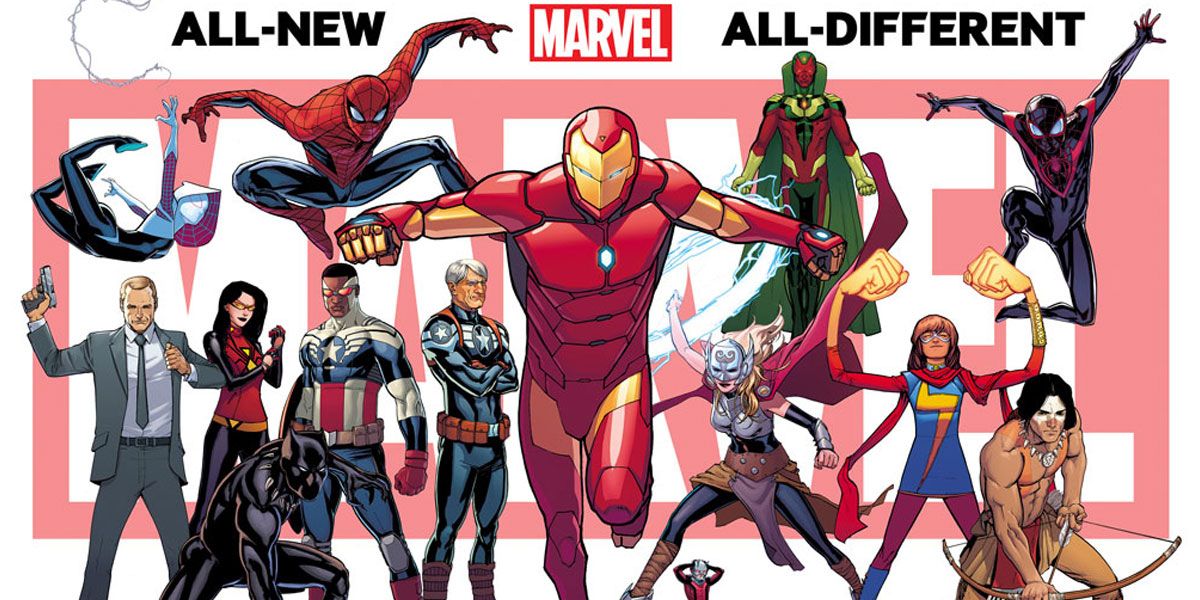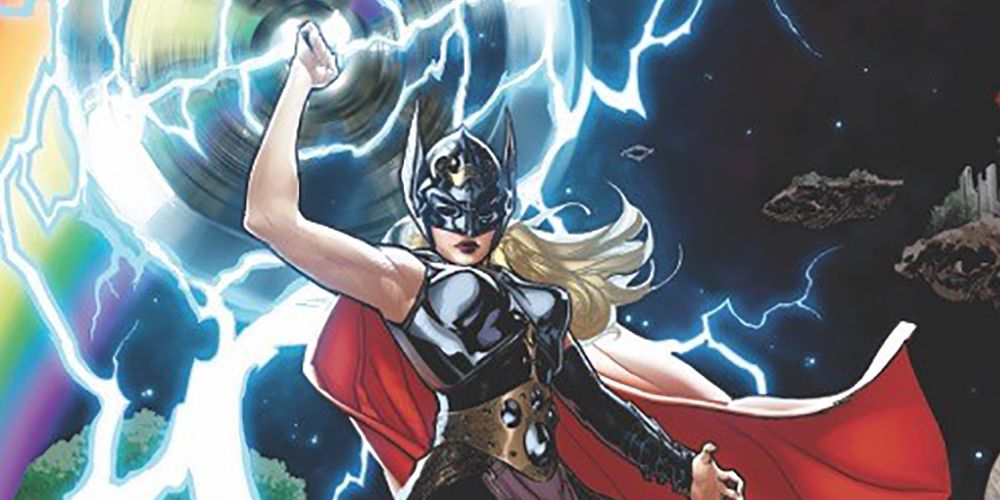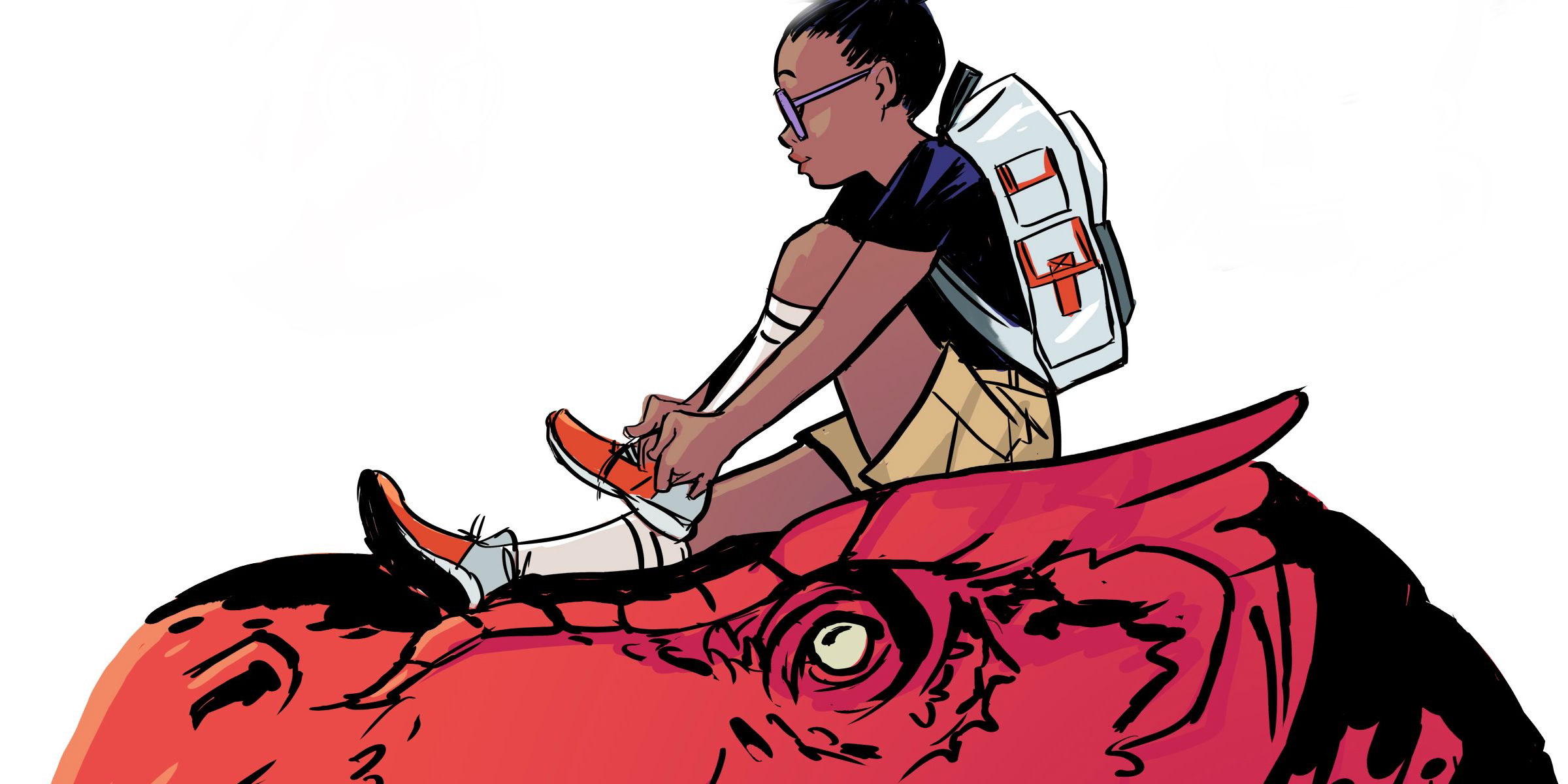Over the past several years, there has been a decided shift in Marvel's superhero line, with the on-page characters starting to look a bit more like people in the real world. We've seen a dramatic increase in series starring female superheroes, as well as a less pronounced (but still significant) increase in titles starring people of color. But now there are signs the shift is over, and the pendulum might be shifting back toward the white, male superheroes of yore.
Last week, David Gabriel, Marvel's senior vice president of sales and market, stated in an interview with ICv2.com that retailers have told Marvel, "people didn't want any more diversity. They didn't want female characters out there. That’s what we heard, whether we believe that or not. I don’t know that that’s really true, but that’s what we saw in sales.”
RELATED: Marvel Exec Clarifies Comments That ‘People Didn’t Want Any More Diversity’
Although Gabriel walked back his original statement a bit the next day, promising, "our fans and retailers are excited about these new heroes. And let me be clear, our new heroes are not going anywhere," "diversity" is and remains a tempting target to blame for Marvel's current sales slump. It paints a simple narrative: Marvel tried to reach out to new audiences, but the sales weren't there. It means all Marvel has to do is shift focus back to its core superheroes and core audience, and everything will be fine.
The problem with that is simple: That narrative is just not true. As I did some digging into comic sales data, a far more complicated story took shape; sales on Marvel's superhero line have slumped across the board since the end of "Secret Wars," with only a single ongoing series selling more that 50,000 copies a month to specialty shops. While All-New, All-Different Marvel Now started out strong in October 2015, it quickly sputtered, with many books hemorrhaging sales, especially after DC's Rebirth relaunch.
One of the major culprits was that the All-New, All-Different relaunch turned out not to be all that new or different, with at least 24 series continuing on post-"Secret Wars" with the same creative team, or at least the same writer. In almost every single case, those continuing series saw dramatic sales drops after their initial relaunch.
Prior to "Secret Wars," these 24 series sold an average of 38,521 single issues through the direct market. But the highest average sales of the most recent issue of these same 24 series was only 22,972 issues -- a 40-percent drop, significantly higher than expected attrition of about 25% over 18 months. Rather than acting as a jumping-on point for new readers, All-New, All-Different Marvel Now appears to have acted as a jumping off point, especially where there was a title change that would result in books disappearing from customers' pull lists (as with "Astonishing Ant-Man," Captain America: Sam Wilson," "The Mighty Thor" and "Rocket Raccoon and Groot"). For these 24 series, All-New, All Different Marvel Now created a moment where many readers had to affirmatively decide to continue reading or drop the title, and many apparently chose the latter.
Another culprit? Between October 2015 and February 2017, Marvel launched or relaunched at least 104 ongoing superhero series, for an average of about six new #1s a month. That is an astounding number of titles. Unsurprisingly, a very large number of these series have failed to find an audience: roughly a quarter (25) were canceled with 10 or fewer issues published; at least another seven books (7 percent) launched in late-2016/early-2017 appear to be very likely to meet the same fate, even if their cancellation has not yet been formally announced.
Looking at the data, it's difficult not to get the sense that Marvel has been throwing everything at the wall, hoping that something will stick. Unfortunately, not much has been sticking. In February 2017, Marvel published only two ongoing superhero series that sold above 40,000 single issues: "The Amazing Spider-Man" (61,953) and "The Mighty Thor" (40,175). The predecessors of both series were among Marvel's top sellers in 2015, with their last pre-"Secret Wars" issues selling 88,338 and 86,222 copies, respectively. The remainder of Marvel's top 10 books all sell in the 35-39,000 copy range. Prior to "Secret Wars," Marvel's top 10 ongoing superhero titles were all selling above 50,000 copies per month. That is a significant drop in sales, indicating a hollowing-out of Marvel's customer base.
Just to be clear, "diversity" has very little to do with the drop in sales in Marvel's top 10 books. Only three ("The Mighty Thor," "Invincible Iron Man" and "Black Panther") can be considered "diverse," in that they star a lead character who is a woman or a person of color. The rest are series starring white male heroes or teams made up predominantly of white male heroes. These are Marvel's traditional A-list heroes, being written and drawn by A-list writers and artists (almost all of whom are themselves white men), and yet they are floundering.
That is not to say that these particular books are selling worse than they should be. Several, including "Invincible Iron Man," "Doctor Strange" and "Black Panther," sell well above the level of previous series involving the same characters, and "The Mighty Thor" continues to sell better than its predecessor, "Thor: God of Thunder," despite its own steep post-"Secret Wars" drop.
But what about the bottom 10? Rather than just focusing on February 2017, I looked at final-issue sales for all books launched since October 2015. The bottom 10 series all had final or most recent issue sales below 9,000 copies, averaging 7,161 copies sold to retailers. Of these, four were canceled in six issues or less ("Solo," "Starbrand and Nightmask," "Red Wolf" and "Hyperion"), one was canceled at issue 11 ("Drax"), one was canceled at issue 17 ("Patsy Walker, A.K.A. Hellcat!"), and three are very likely to be canceled imminently ("Slapstick," although its digital-first situation may skew expectations, "Foolkiller" and "Mosaic"). That leaves one special case: "Moon Girl and Devil Dinosaur," a title that sells quite poorly through the direct market (the last issue sold an estimated 8,440 copies), but very well in trade, due in no small part to being represented at Scholastic Book Fairs.
Of these bottom 10 books, five (50 percent) would qualify as "diverse" under my criteria above. But, again, this includes "Moon Girl and Devil Dinosaur," one of Marvel's few books that sells disproportionately well in trades, as well as "Red Wolf," a book that faced criticism by Native American critics for its reliance on dated stereotypes.
More broadly, series with "diverse" leads accounted for 40 of the 104 series launched or relaunched post-"Secret Wars," approximately 38.5 percent. Of these 40 series, 15 (37.5 percent) have been canceled, slightly below the 40.4-percent cancellation rate since October 2015. This is not because "diverse" series are being given a pass; the average sales at cancellation for all axed series was 14,342, while it was 13,648 for "diverse" series, a difference entirely attributable to the end of books like "International Iron Man" and "All-New Hawkeye" that were selling fewer than 20,000 copies when their runs ended as planned.
That said, it is true that "diverse" series have sold slightly worse than those fronted by white male superheroes. While in February 2017, Marvel's ongoing superhero books averages 24,853 copies sold, the average for ongoing "diverse" titles was 22,086, a deficit of 2,767 copies (about 11 percent). But, the fact that books starring women and people of color don't sell quite as well on a whole as books starring white men does not mean that diversity is to blame for Marvel's ails, especially when the publisher has shown it is willing to cancel low-selling "diverse" titles at about the same sale thresholds as other series.
While Marvel has admittedly had some misses among its "diverse" titles, it has also had some genuine hits. "The Mighty Thor" remains Marvel's No. 2=selling ongoing superhero series. "Black Panther" has been a solid hit as well, selling enough single issues to be in Marvel's top 10, and enough trades to make the bestseller lists. "Invincible Iron Man" (starring Riri Williams) is also in the top 10, showing very little attrition from writer Brian Micahel Bendis' pre-"Civil War II" series. "Spider-Man" is close behind, selling about 5,000 more copies than Miles Morales' pre-"Secret Wars" series."Spider-Gwen" and "All-New Wolverine" are also both doing well, with more than 29,000 copies sold in February for both titles. And then there's "Ms. Marvel" and "The Unbeatable Squirrel Girl," two series whose trades have also made the bestsellers lists.
Having dug into the data, it's become clear that diversity is not hurting Marvel. The truth is, Marvel's "diverse" titles actually sell decently. The problem, instead, appears to be a hollowing-out of Marvel's traditional A-List, titles whose sales have dropped by tens of thousands of copies in the past few years. Especially painful has been the collapse of X-Men sales, which once made up Marvel's bread and butter, though the Avengers and Guardians of the Galaxy lines have also seen a major declines since "Secret Wars." Blaming "diversity" only goes so far when it is series about white men and teams of white men that have been dropping the furthest.
There are many potential explanations for why Marvel's sales have declined since "Secret Wars" -- the decision to relaunch titles that were already selling well, a weak slate of new series, reader fatigue with the seemingly unending string of events and crossovers, a desire for more escapist stories at a time when Marvel was prepping for an event about fascism, steep competition from DC's Rebirth relaunch, poor marketing outside of the direct market, etc. -- but the publisher's current focus with "diversity" is not among them.



